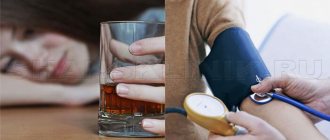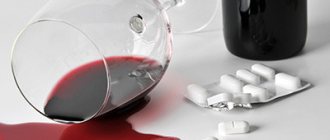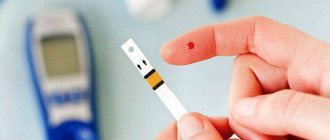Home>Articles>How alcohol affects blood pressure
quick menu (hide)
- Alcohol and blood pressure
- The effect of alcohol on blood pressure
- Is it possible to drink alcohol with high blood pressure?
- What alcohol lowers blood pressure?
- Alcohol to increase blood pressure
- Anti-hypertension tablets compatible with alcohol
People with hypertension are interested in whether alcohol increases or decreases blood pressure, how does drinking alcohol affect the state of the arterial system? It is worth understanding how certain drinks can affect blood pressure. Doctors do not advise drinking alcohol to test its effect on the body. It is better to first learn about the effect of alcohol on blood vessels in various diseases.
Alcohol and blood pressure
To determine how intoxication affects the condition of healthy people, doctors conducted an experiment. During the study, they asked 20 subjects (equally divided between men and women) to drink 50, 100 or 500 ml of vodka, wine or beer, respectively. Half an hour later they took a blood test and checked my blood pressure. The results of the study revealed the following:
- blood pressure increased;
- the level of ESR (erythrocyte sedimentation rate) in the blood has increased;
- Heart rate increased.
After the experiment, the subjects did not notice any changes. Continuing the study, doctors asked participants to drink the same dose of alcohol daily for 2 weeks in a row. After the specified time, 2/3 of the group reported general morning sickness and rapid heartbeat. The strength of the drinks did not affect these signs. The rest of the participants felt the same as before the experiment.
Alcohol consumption standards
Each person has his own alcohol intake limit . It is influenced by gender, body condition and the presence of diseases. Contraindications in any case apply to the following cases:
- pregnancy;
- lactation;
- age under 18 years;
- disorders of brain activity;
- liver and kidney diseases;
- allergy to alcohol.
Drinking drinks containing ethyl alcohol disrupts the functioning of the heart, pancreas and gall bladder. It has a negative effect on the optic nerve. for people who have any problems with these organs not to drink alcohol. The rest can drink daily - up to 75 ml of vodka, up to 200 ml of wine, up to half a liter of beer. However, even with daily intake of the specified amount of alcohol, a person develops a bad habit. Over time, the body requires large doses, which leads to binge drinking and the development of alcoholism.
The weekly dose of alcohol for a person without health problems is 300-400 ml of vodka (at a single dose). For wine this norm is about 1000 ml, for beer – 3 liters. When taking alcohol-containing drinks twice a week, you should reduce the dose by half.
Women are also advised to reduce their levels, as their bodies are sensitive to ethanol.
Contraindications
It is not recommended to drink cognac for people with gastrointestinal diseases.
It is not recommended to drink cognac for pregnant and lactating women, children, hypertensive patients, persons suffering or have suffered from alcohol addiction, diseases of the gastrointestinal tract and excretory system, diabetes mellitus.
It is not recommended to consume low-grade types that contain cheap alcohol and chemical ingredients, because such a drink is extremely harmful to the body. In this case, the digestive organs and central nervous system are primarily affected.
How does alcohol affect blood pressure?
It is possible to determine exactly how alcohol affects blood pressure levels only experimentally. To do this, it is necessary to measure it with a tonometer after each intake of alcoholic drinks. Measurements should be taken after half an hour. If you take measurements regularly, it is easy to identify a pattern. However, even with small doses of alcohol, daily consumption of alcohol leads to changes in the condition of the vascular walls. Blood pressure after drinking alcohol frequently begins to increase, and sometimes changes unpredictably.
Alcohol at low blood pressure
In hypotensive patients, the walls of blood vessels are in a relaxed state. Drinking ethyl-containing drinks in small quantities leads to their even greater expansion. Accordingly, the pressure decreases . An increase in heart rate after drinking alcohol leads to worsening blood circulation in the extremities, so many hypotensive people feel as if their legs are going numb.
By regularly drinking alcohol, a person with low blood pressure provokes the release of the hormone hypertensin into the blood. As a result, blood counts increase. In addition, frequent consumption of alcohol-containing drinks causes renal dysfunction.
Depending on the dosage and age group, when drinking alcohol-containing drinks, blood pressure can either decrease or increase . Scientific studies that can give an accurate answer about the effect of alcohol on blood pressure have not yet been conducted.
Alcohol for high blood pressure
In hypertension, alcohol causes an even greater increase in blood pressure if a person drinks a lot or constantly. Alcohol provokes an increase in heart rate. Adrenaline and stress hormones are released into the blood. For those suffering from hypertension, it is better not to drink alcohol at all, as the risk of stroke increases significantly.
Possible consequences
Among the heart pathologies caused by systematic abuse, the most common are:
- chronic heart failure;
- alcoholic cardiomyopathy;
- organic and functional myocardial lesions, ischemic heart disease;
- arrhythmias.
The danger is posed by changes caused by prolonged binge drinking or a state of abstinence, during which severe complications develop.
- Ischemic strokes, accompanied by impaired cerebral circulation, leading to partial paralysis and disability.
- Arrhythmias, manifested either by a rapid heartbeat or a slowdown.
- Hypertensive or hypotensive crises are cases of sustained decrease or increase, tolerant to the action of drugs.
- Myocardial infarction, causing partial impairment or loss of pumping function.
- Transient ischemic attacks are cerebral circulatory disorders that cause neurological abnormalities: speech disorders, loss of memory or motor functions, paresis.
Alcohol increases and sometimes decreases blood pressure. In addition, it neutralizes the effects of drugs to normalize blood pressure. Because of this, during horse racing, the attack cannot be controlled with medication.
Is it possible to drink alcohol with high blood pressure?
For hypertensive patients there is no complete ban on drinking alcohol. However, it is better to decide how much to drink after visiting a doctor. It is important to maintain long intervals between doses. With constant or excessive consumption of alcohol, blood pressure (blood pressure) begins to increase.
There are a number of factors under which it is better not to drink alcohol:
- obesity or excess weight;
- tendency to form blood clots in blood vessels;
- reduced elasticity of vascular walls;
- increased intracranial pressure;
- tendency to swelling;
- elevated blood sugar or cholesterol levels;
These factors increase the risk of developing hypertension, even if the drinks are low in alcohol. Drinking beer has a negative impact on kidney function. If you have hypertension, it is better not to drink alcohol more than once a week. It is important to follow the individual dosage.
Who is it contraindicated for?
You should not draw independent conclusions about the advisability of drinking alcohol. It is important to undergo preventive examinations with doctors in order to notice this or that pathology in time. Absolute contraindications to even small doses of alcohol are:
- severe form of hypertension (stable high blood pressure);
- ulcer, pancreatitis, gastritis;
- migraine;
- allergy;
- bronchial asthma;
- mental disorders;
- alcohol addiction.
Under no circumstances should you drink alcohol during pregnancy and breastfeeding, regardless of what indicators are noted on the tonometer screen
What alcohol lowers blood pressure
Finding an alcoholic drink that lowers blood pressure is problematic. Everything is very individual. Alcohol that lowers blood pressure includes balsam, cognac or whiskey. However, they should be consumed only in the permitted dosage. The pressure decreases temporarily - for 1-2 hours. After this, it increases, often even more than previous indicators. In addition, repeated doses may not only fail to have the desired effect, but may also increase vascular tone. At the same time, the pressure increases.
Cognac for hypertension
Cognac is distinguished by its ability to reduce blood pressure if consumed in a volume of 30-40 ml 1-2 times every 7 days. It dilates blood vessels, which causes changes in blood pressure. The drink should not be consumed if you plan to take pills for hypertension.
Doctors deny the effect of lowering blood pressure when taking cognac. Since hypertension is a complex disease, it should be treated only after a comprehensive evaluation. It is not safe for patients with hypotension to resort to drinking cognac, since the consequences are difficult to predict.
White wine for high blood pressure
The effect of white wine on blood pressure is ambiguous. It is made from natural ingredients, unlike most strong drinks. Ethyl alcohol is not used in its production
White wine is consumed in European countries that are famous for their longevity. However, even among them this drink is not used for medicinal purposes. People with hypertension are allowed to drink white wine on rare occasions, preferably only on holidays. The difference between this drink is that it causes fewer complications . Since high blood pressure after alcohol occurs with frequent use, moderate consumption may not have any effect on health.
conclusions
Before drinking cognac or any other alcoholic drink, you need to check the possible reaction of your body. To do this, you can conduct a small experiment, namely, measure blood pressure before drinking alcohol and immediately after drinking. This will help determine whether this drink increases blood pressure or, conversely, reduces it.
The effect of cognac depends on the amount drunk. When the recommended dose is increased, alcohol negatively affects not only the cardiovascular system, but also the entire body.
Important! Before using cognac for medicinal purposes, consult your doctor.
Alcohol to increase blood pressure
Regular drinking is one of the factors that increases blood pressure. The dosage should be higher than normal. If you drink small amounts of champagne, beer or vodka, you can increase your blood pressure. However, in some cases the body reacts to such effects unpredictably , so the use of ethyl drinks as a medicine is not recommended. This attitude towards one’s health can lead to a hypertensive crisis – a sharp increase in blood pressure to 180/110 mmHg. Art. and higher.
Factors that change the effect of cognac
Before treatment, it is important to consider factors that may enhance the effects of cognac. First of all, this is the condition of blood vessels and the heart, ongoing somatic diseases and taking medications.
Cognac reduces the therapeutic effect of drugs that lower and increase blood pressure, and when used together can lead to acute poisoning.
You should not drink cognac if your body is severely dehydrated in a bathhouse, if it is hot, or if you have long-term diarrhea. With a lack of fluid, blood volume decreases; an additional decrease in pressure can lead to a collapotid state even in hypertensive patients.
Combining any dose of alcohol with carbonated drinks speeds up the effects of ethanol. A short period of decreasing pressure can lead to a sharp jump in indicators upward.
Which hypertension pills are compatible with alcohol?
People who regularly take medications for hypertension should know whether they are compatible with alcohol. By reading the instructions for various medications, you can accurately determine whether it is acceptable to drink during treatment. In most cases alcohol is contraindicated , since the reaction of blood vessels to the simultaneous use of drugs and alcohol can be unpredictable.
You can connect alcohol intake and blood pressure only after monitoring your body. However, it is not recommended to experiment regularly. People with blood pressure disorders are advised to keep alcohol intake to a minimum.
If you take alcohol every day, your blood pressure does not have time to normalize, which causes jumps in blood levels. In the case of moderate consumption of alcoholic beverages once a week, the total volume of alcohol increases more slowly.
Since hypertension is a dangerous disease, patients with this diagnosis require mandatory medical supervision. If there is no treatment, hypertensive patients should limit or stop drinking alcoholic beverages.
Literature:
- Risk factors for arterial hypertension / V. R. Weber, B. B. Fishman; Feder. education agency, Novgorod. state University named after Yaroslav the Wise, Novgorod. scientific Center of the Northwestern Branch of the Russian Academy of Medical Sciences. — St. Petersburg: Novgor. state univ., 2005 (St. Petersburg: Printing house “Science”). — 207 p.
- Hypertension. High blood pressure disease [Electronic resource]: blood pressure control, non-drug methods for treating hypertension, lowering blood pressure with the DASH diet: 12+ / P. A. Fadeev. - Moscow: Eksmo, 2014. - 430 p.
- Alcohol and arterial hypertension / Ostroumova Olga Dmitrievna, Saperova Ekaterina Vladimirovna / 2014 / Rational pharmacotherapy in cardiology.
- Changes in the daily blood pressure profile under the influence of systematic alcohol consumption / Zhirov I.V., Ogurtsov P.P., Shelepin A.A. / 2000 / Bulletin of the Peoples' Friendship University of Russia. Series: Medicine.










